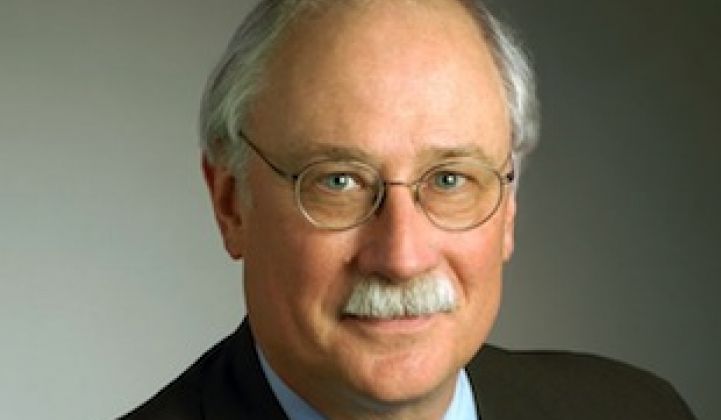Last month, Jon Wellinghoff announced his resignation as chairman of the Federal Energy Regulatory Commission, the federal authority that rules the power grid and energy markets. His four-year tenure was marked by lots of support for renewable energy integration, smart grid innovation and other 21st century grid challenges.
On Thursday, President Obama nominated a new FERC chairman who appears likely to carry on that vision. That’s Ron Binz, a long-time utility regulator and former chairman of the Colorado Public Utilities Commission from 2007 to 2011, a time when the state was going through quite a bit of growing pains having to do with green power and smart grid.
Binz’s long-time support for renewable energy hasn’t won him any friends in the coal power industry. As a key backer of the state’s Clean Air-Clean Jobs act, a set of regulations that ended up closing six coal-fired power plants at a cost of about $1 billion, Binz faced down accusations of conflicts of interest from coal and power generator groups, as well as an ethics probe, called for by a Republican state lawmaker, that found no breach of public trust, the Denver Post reported.
At the same time, Binz’s proposed nomination drew praise this week from the American Wind Energy Association, the Solar Energy Industries Association, the Advanced Energy Economy industry efficiency association, and other green-themed industry groups. Executives at utilities like New Jersey’s PSE&G and New England’s National Grid also chimed in, noting his experience and expertise in the nitty-gritty issues that utilities face. His decade-long tenure (1985-1994) representing utility customers as part of the state’s Office of Consumer Counsel has given him support amongst utility customer and ratepayer advocates.
Binz also played an important role in regulating the troubled SmartGridCity project in Boulder, Co., an expensive and contentious, $100-million-plus citywide grid network that’s now embroiled in the city’s move to form its own utility. The $100 million project between Xcel Energy and a who’s-who of smart grid partners quickly went over budget, driven by costs of laying underground fiber communications in a city known for its rocky soil.
That led Xcel to ask the CPUC for a ratepayer increase, which hadn’t been part of its original plan. In 2011, Binz was among the commissioners who voted to allow Xcel some $28 million of the $44.5 million it had asked for, but held the remaining $16.6 million until the utility could prove a benefit to state ratepayers from the project.
Binz, who faces a confirmation process in the U.S. Senate, now serves as a principal in Public Policy Consulting, and as a Senior Policy Advisor at the Center for the New Energy Economy at Colorado State University. In that capacity, he’s advised Colorado companies including the reformed Qwest Communications and long-time home energy management startup Tendril, among others, Bloomberg reported.
Binz and fellow former Colorado utility commissioner Ron Lehr have also formed a nonprofit group called Utilities 2020 to work on the complex regulatory and economic challenges that come with integrating lots of rooftop solar panels, energy-aware appliances and other new loads onto the grid.
“What we’re looking for is a spectrum of approaches that can be used in different states for different utilities,” Binz told Greentech Media in a March 2012 interview. (Greentech Media has been listening to Binz’s opinions on the smart grid since we named him one of the industry’s top players to watch in our 2010 Networked Grid 100 list, by the way.)



